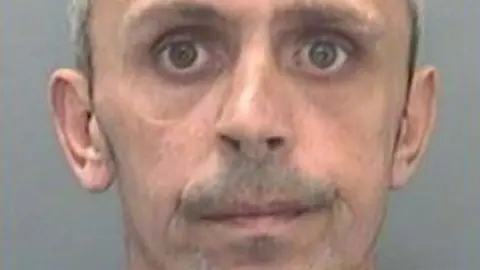Gilfach Goch body in river had multiple injuries, inquest hears
 South Wales Police
South Wales PoliceA man whose body was found lying in a stream had suffered a catalogue of serious injuries before his death, an inquest has heard.
South Wales Police launched a murder inquiry following the death of Jamie Perkins, 41, in Gilfach Goch, Rhondda Cynon Taff, on 1 November 2017.
Arrests were made but the murder remains unsolved despite a £10,000 reward for information.
An inquest in Pontypridd is expected to last for two weeks.
The hearing was told Mr Perkins' decomposed body was found partially submerged in the water and was covered in leaves, bracken and a speaker cover.
Home Office pathologist Dr Andrew Davison, said Mr Perkins had suffered fractures to the skull, broken ribs and cuts to his face. He was also missing a tooth.
However, he could not be sure of the cause of death because he did not have the full facts about what may have happened.
"All I can say is that the head injuries could be relevant, the pressure to the neck could also be relevant," Mr Davison told the inquest.
He said taking the level of decomposition into account, Mr Perkins had died "days not weeks" after he was last seen which was around 8 October.
Toxicology tests showed evidence he had amphetamines and the drug pregabalin in his system. Pregabalin is prescribed for conditions including epilepsy.
The inquest was told Mr Perkins was a drug user who had been "in and out of prison," since he was first convicted at the age of 18.
In a statement made by Mr Perkins' late father John to South Wales Police at the time of his death, he said his son had been "pushed over the edge" by the death of his best friend around the time he was 14 to 16 and that had led to his drug use.
The hearing was told Mr Perkins' father had to stop him coming to his home because "he would return in the early hours of the morning and the police would be knocking".
He slept rough and repeatedly went to his GP asking for prescriptions for drugs including the heroin substitute Subutex and diazepam.
At times he had been violent and so appointments were conducted with GPs under the Safe Haven Scheme, sometimes with a police officer present, the hearing was told.
The inquest continues.